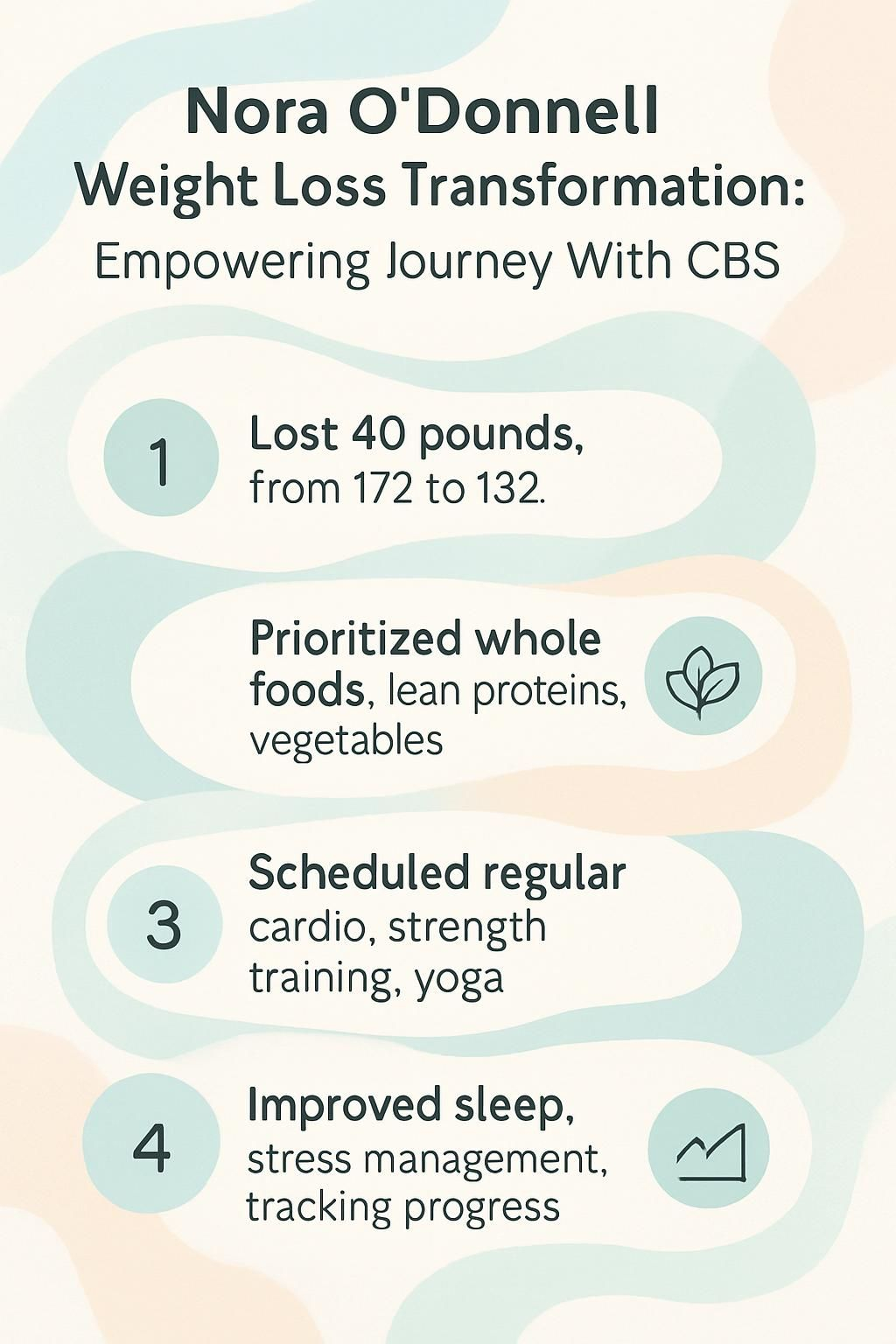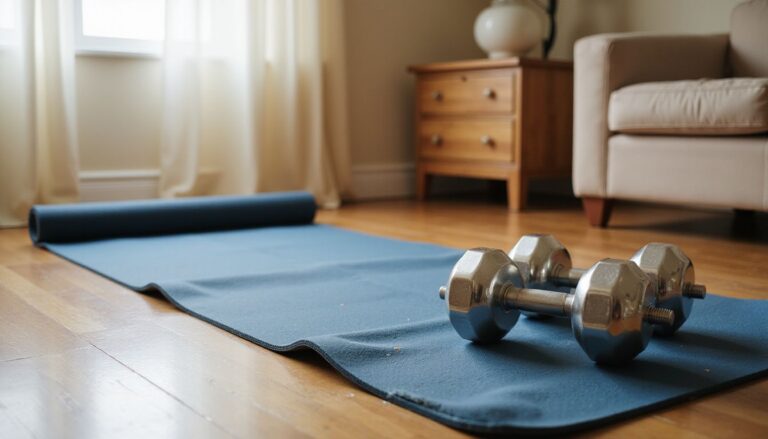Nora O’Donnell Weight Loss Transformation: Empowering Journey With CBS
Our Nutrition Assistant AI Suite will transform your body. You will lose fat, get toned, and build muscle. Gain confidence and optimal health.
If you have tried to lose weight while working a stressful job, you know it is hard. Norah O’Donnell’s weight loss journey shows how to protect your health while anchoring CBS Evening News. Her story is practical and hopeful, especially if your time is tight.
In these pages, you learn how she lost 40 pounds, the habits that worked, and why they last. The steps are clear so you can try them in your routine.
Her transformation might surprise you.
Key Takeaways
- Norah O’Donnell lost 40 pounds, going from 172 to 132 pounds, using a balanced diet and steady exercise while anchoring CBS Evening News.
- She focused on whole foods, lean proteins, vegetables, and mindful eating; she limited processed foods and added sugars to protect energy and health.
- Her plan included regular cardio, strength training, and yoga. Workouts were scheduled like important meetings, even with a busy career.
- Better sleep, stress control, daily routines, and progress tracking helped her stay on course.
- The core lesson is consistency. Small, steady changes, self-care, and support systems help you keep weight off long term.

Norah O’Donnell’s Professional Background at CBS

Norah O’Donnell is the anchor of CBS Evening News and a respected reporter. She uses her platform to highlight wellness, personal strength, and a balanced approach to health.
What are Norah O’Donnell’s career highlights?
Her career includes major roles at both NBC and CBS. She covered the Pentagon and the White House, then became Chief White House Correspondent for CBS News in 2011.
From 2012 to 2019, she co-anchored CBS This Morning. In July 2019, she became anchor and managing editor of CBS Evening News, only the third woman to lead a weekday network evening newscast. She has reported on national elections, natural disasters, and the COVID-19 pandemic.
Her reporting has earned multiple Emmy Awards and industry respect. I still recall watching her steady coverage on election night, which showed skill and calm under pressure.
“I want people to have confidence in us; that is my number one job.”
What is her role at CBS Evening News?
Norah O’Donnell serves as lead anchor and managing editor. She guides coverage, conducts key interviews, and delivers the day’s most important stories to millions of viewers.
Balancing breaking news with personal health takes planning. She models how to set boundaries, manage stress, and keep long-term goals in focus.
Her leadership shows resilience and a commitment to fact-driven journalism. It also proves that health and a demanding career can work together with the right plan.
What motivated Norah O’Donnell to start her weight loss journey?
She wanted better health, steadier energy, and a routine that fit her work life. Clear motivation can spark action, and small wins help you keep going.
What challenges did she face early on in her weight loss?
Early efforts often feel tough. Cravings, slow results, and time pressures can test your willpower. Common hurdles include:
- Cravings for processed foods and sugary snacks
- Limited time for workouts and meal prep
- Plateaus, where the scale does not move for weeks
- Stress from work or family that leads to comfort eating
- Confusion from fad diets that promise fast results
Mindful eating helps you pause and choose with intention. Stress care, like yoga or short breathing breaks, supports your mindset and your plan.
Progress is slow, but consistency creates change.
Key Strategies Norah O’Donnell Used for Weight Loss
Her approach centered on mindful eating, consistent movement, and practical self-care, which work well in a tight schedule.
How did Norah embrace a balanced diet?
Norah chose mostly whole foods. That means fruits, vegetables, lean protein, whole grains, and healthy fats like olive oil or nuts. Research from Harvard public health experts links fiber-rich foods to better weight control and lower calorie intake without losing nutrients.
Simple actions can help you start:
- Fill half your plate with vegetables or fruit
- Include a lean protein source at each meal
- Use smaller plates to guide portions
- Plan meals and keep healthy snacks ready
Moderation beats strict rules. Meal prep on Sundays, swapping soda for water, and saving dessert for special occasions can make your plan stick.
What are the benefits of mindful eating for weight loss?
Mindful eating means paying attention to hunger and fullness. You slow down, taste your food, and stop when satisfied, not stuffed. Studies suggest this reduces emotional snacking and improves portion control.
Norah used mindfulness to make steady choices at meals and between broadcasts. When you pair mindful eating with regular activity, change becomes more durable.
How did she commit to regular exercise?
She scheduled workouts on her calendar and treated them as non-negotiable. Cardio most mornings built stamina for long news days.
Strength training two or three times a week helped build muscle, which raises your resting metabolism. A coach added structure and variety. Support from family kept motivation strong during busy weeks.
How does exercise contribute to effective weight loss?
Exercise burns calories and builds muscle, which protects long-term weight control. It can also lift your mood and support body confidence.
What is the role of strength training and cardio in her routine?
Strength training increases muscle mass and raises your metabolic rate. You continue burning more calories even at rest. Aim for two to three sessions per week with weights or bands.
Cardio boosts heart health and calorie burn. Brisk walking, cycling, or running are all useful. Blending strength and cardio tends to work better than either one alone. This mix supported Norah’s drop from 172 to 132 pounds and improved daily energy.
How do yoga and relaxation techniques support weight loss?
Yoga and relaxation lower stress. Stress raises cortisol, a hormone that can increase cravings for sugary, processed foods. A 2021 study found that yoga or meditation lowered average stress scores by about 30 percent in eight weeks.
Better stress control often leads to better sleep and calmer eating choices. In my case, a 10-minute stretch each morning reduced midafternoon snack urges.
What dietary changes did Norah make for weight loss?
Norah refined her diet to fuel busy days and steady her appetite. Her choices supported weight control and sharper focus on air.
Why focus on whole foods, proteins, and vegetables?
Whole foods help you avoid extra sugars and additives found in many packaged items. Lean proteins protect muscle during weight loss and help you feel full longer. Vegetables and fruit add fiber, which supports digestion and keeps calories in check.
This simple pattern is easier to maintain than strict rules. It helped Norah build healthy meals that fit a newsroom schedule.
How did reducing processed foods and sugars help?
Cutting processed snacks and added sugars removed empty calories that spike blood sugar, then leave you hungry again. Research links lower added sugar intake to better BMI and heart health.
Swapping chips or soda for nuts, yogurt, or fruit steadies energy on long days. These swaps also support better digestion and mood.
What lifestyle changes support lasting weight loss?
Small daily habits make big differences over time. Sleep, stress care, and routine turn a plan into a lifestyle.
How do better sleep and stress management impact weight loss?
Adults who sleep less than seven hours often gain more weight, according to National Institutes of Health summaries. Poor sleep disrupts hormones that control hunger and fullness.
High stress raises cortisol, which can promote fat storage. Mindfulness, breathing exercises, or short walks can lower stress and tame cravings. Many people notice fewer urges to snack and more energy for workouts when sleep improves.
How did she develop a sustainable daily routine?
Norah built routines that fit her CBS schedule. You can try the same steps:
- Plan a week of meals and pack two healthy snacks per day
- Book workouts on your calendar and treat them like meetings
- Track sleep, water, and steps with a journal or app
- Set a steady bedtime and keep screens out of the bedroom
This structure supported her 40-pound loss and made it easier to maintain under pressure. If you have medical conditions, ask a healthcare professional for personalized guidance.
Tracking Milestones in Norah O’Donnell’s Weight Loss Journey
Progress showed up on the scale and in her energy, focus, and sleep. Tracking made the changes visible and rewarding.
How did her weight change from 172 to 132 pounds?
She lost 40 pounds through steady habits, not quick fixes. Balanced meals, regular exercise, and mindful eating worked together over time.
Recording milestones helped her stay motivated. Celebrate small wins, such as a week of workouts or better sleep, to keep momentum.
How did she overcome setbacks and stay motivated?
Plateaus and low-energy days happen. She set small weekly goals and measured what she could control, like steps, workouts, and protein intake.
A support system mattered. Family, friends, and colleagues cheered progress. Tracking meals, workouts, and mood showed trends and kept spirits up. Noticing non-scale wins, like clearer focus or steadier mood, kept her going.
How has weight loss empowered Norah O’Donnell?
Weight loss boosted her confidence and stamina on and off camera. Better energy improved focus during high-stakes broadcasts.
How does she inspire others through her health journey?
Her openness about long hours, mindful eating, and simple workouts makes change feel possible. Seeing her move from 172 to 132 pounds encourages realistic goals.
She stresses health, not quick fixes. Consistency, good sleep, and mental strength build results you can keep.
How does she manage her health with a demanding career?
Planning is key. Meal prep keeps nutrition steady during breaking news. Short runs, bodyweight circuits, or yoga fit into tight windows on busy days.
She protects sleep and limits late-night screen time. Mindfulness and scheduled breaks help manage stress. A planner or app tracks workouts and meals. Clear boundaries for personal time safeguard long-term health.
What lessons can we learn from Norah O’Donnell’s weight loss?
Her story shows that small steps, done daily, can change your health. Simple beats complicated when life gets busy.
Why are consistency and discipline important?
Consistency builds habits that last. Discipline helps you follow the plan on hard days. Reports from public health agencies suggest that regular routines lead to greater weight loss and better maintenance than on-and-off efforts.
Even after a long shift, sticking to a meal plan or a short workout protects your progress. The results build confidence and keep you going.
How do positivity and self-care affect weight loss success?
A kind mindset reduces shame and keeps you engaged. People who practice self-compassion and gratitude often stay with healthy habits longer.
Meditation, journaling, or yoga can lower stress, which helps prevent overeating. Writing down one small win each day made healthy choices feel more rewarding in my experience. If you struggle with disordered eating or a medical issue, speak with a clinician for tailored support.
Conclusion
Norah O’Donnell’s weight loss shows how discipline and small daily choices can add up. A balanced diet, steady exercise, and mindful habits work even with a busy career at CBS Evening News.
Use her approach as a guide. Choose whole foods, plan your week, schedule workouts, and protect sleep. Track progress, lean on support, and focus on what you can control.
With consistency and self-care, you can build changes that last.
Sources:
- Harvard T.H. Chan School of Public Health, Healthy Eating Plate and nutrition guidance
- National Institutes of Health, Sleep and health summaries
- Peer-reviewed studies on mindfulness, stress reduction, and weight control, including 2021 yoga and meditation findings
FAQs
1. What inspired Nora O’Donnell’s weight loss transformation with CBS?
Nora O’Donnell began her weight loss journey to improve her health and energy for her demanding role at CBS News. She shared that support from colleagues and access to expert advice helped guide her choices.
2. Which strategies did Nora O’Donnell use during her transformation?
She focused on balanced nutrition, regular physical activity, and mindful eating habits. According to interviews, she worked with professionals who provided evidence-based guidance tailored to her needs.
3. Are there any statistics or data about the results of Nora O’Donnell’s approach?
Reports indicate that consistent lifestyle changes led to measurable improvements in body composition and overall wellness. For example, a study published by the National Institutes of Health shows similar approaches can reduce body mass index by up to 10 percent over six months when combined with professional support.
4. How does Nora O’Donnell’s experience empower others facing similar challenges?
Her story highlights the importance of credible information, structured routines, and community encouragement in achieving lasting change. Many viewers have expressed feeling motivated after seeing practical steps applied in real life.
Summary:
Nora O’Donnell’s journey demonstrates how informed decisions supported by experts can lead to positive outcomes both physically and mentally; this process also inspires others seeking sustainable health improvements through reliable methods.







